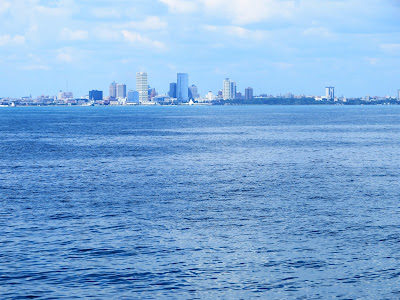I never paid attention to the Great Lakes. I'm not even sure I could name all five of them. Can you?
I spent most of my life in New York state, which borders Lake Erie and Lake Ontario, and I now live in Pennsylvania which also touches Lake Erie. But I have always lived downstate so the waters I see are not the Great Lakes, but Long Island Sound, the Atlantic Ocean, the Hudson and Delaware rivers.
To be sure, I have spied Lake Michigan a few times, when I was in Chicago, and once I glimpsed Lake Erie from Buffalo. I've also seen Niagara Falls -- does that count? But the Great Lakes simply do not loom large in my mind.
Until a couple of weeks ago. That's when we boarded a ferry to cross Lake Michigan. It turns out . . . those lakes are big!
 |
| Harbor in Muskegon, Mich. |
We left Muskegon, Mich. at 10:15 a.m., heading west, due to arrive in Milwaukee, Wis. at 11:45 a.m.. An hour-and-a-half voyage, I thought. But no, it's actually a 2-1/2-hour journey because of the time change, from Eastern time to Central time. And that's the high-speed ferry. The regular ferry takes four hours to make the crossing.
 |
| Ship docked in Muskegon |
It's about 90 miles across the lake, and you're out of sight of land for half the trip. It's a lot of water, which is why the Great Lakes are called an inland sea -- the largest group of freshwater lakes on earth, according to one source, containing 21% of the fresh water on the surface of the globe.
 |
| Michigan fishing boat |
The Great Lakes are subject to storms and rolling waves. But when we made the crossing the waters were calm. In case you're wondering, masks were required inside the rather spacious cabin, but not outside since the speed of the boat created a 30-40-mph wind in our face.
 |
| Goodbye Muskegon |
But we knew we couldn't let complacency overtake us. After all, we were headed to Door County for a week's vacation. This region of Wisconsin is like a finger sticking out into Lake Michigan, with the lake to the east and Green Bay on the other side.
 |
| Open water |
The county is named from the French Porte des Morts, or Death's Door. The name refers back to a deadly raid in the 1600s by a group of Native Americans against a rival tribe. But later the name proved providential for Europeans since the passage became the site of scores of deadly shipwrecks suffered by French explorers and others who dared make the turn around the northern tip of the peninsula into the safety of Green Bay.
 |
| Land ho! |
According to the Great Lakes Shipwreck Museum, in all at least 6,000 ships and 30,000 lives have been lost on the Great Lakes. Some historians say the numbers are even higher, as many as 25,000 ships in the course of the past 300 years.
 |
| Milwaukee skyline |
But as I said, the day we were on the lake the waters were calm, the sailing smooth, the trip offering a safe and pleasant morning. And so we continued on . . . to tempt the fates of Door County.



